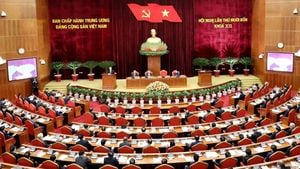Germany has entered a new political phase following the recent federal elections, where Friedrich Merz, the leader of the conservative Christian Democratic Union (CDU), is poised to assume the chancellorship. Preliminary results from the election show the CDU/CSU coalition leading comfortably with around 30% of the votes, marking Merz's dramatic return to power after more than a decade away from the political limelight.
Merz, at 69, will be the oldest chancellor since the founding of the Federal Republic of Germany when he takes office. His path to leadership has been marked by both controversy and determination, particularly his bold stance on immigration policy, which included seeking support from the far-right Alternative for Germany (AfD) during the campaign.
During his tenure as party leader, Merz has aimed to reorient the CDU toward more conservative values, diverging from former Chancellor Angela Merkel's centrist governance. His recent comments on left-wing politics have stirred concerns among rivals, particularly as he described the left as "over" and criticized the protests against far-right extremism.
Polls conducted by the Mannheim-based Forschungsgruppe Wahlen e.V on election day revealed stark divisions along age lines. Older voters predominantly favored the CDU, with 38% of those aged 60 and older casting their votes for Merz's party, but younger voters showed significantly less enthusiasm, with only 13% of under-30s supporting the center-right bloc.
The AfD, meanwhile, has capitalized on growing dissatisfaction among voters. The far-right party saw its support nearly double from previous elections, securing approximately 20.6% of the votes overall. Remarkably, it performed best among the 30-44 age group, reinforcing its position as the primary opposition group.
On the other end of the spectrum, the Social Democratic Party of Germany (SPD) faced dire consequences, landing at 16.4%, marking its worst performance since the time of Bismarck. The party struggled particularly with younger voters, garnering just 11% among those under 30, demonstrating the shifting political tides.
Regional disparities remain underlined by the enduring East-West divide. Since the fall of the Berlin Wall, economic inequalities have persisted, shaping voter behavior. The AfD secured its highest support levels in eastern regions, winning over 40% of the vote in areas like Thuringia and Saxony. This divide reflects broader national sentiments and the disillusionment felt among eastern voters, often reinforcing the AfD's anti-establishment narrative.
Analysts have noted how the economic disparities and sense of neglect contributed to the AfD's rise. The party's appeal lies not only in its promises of populism but also its capacity to manipulate historical grievances stemming from the reunification process.
With the CDU and SPD both seeking strategic partnerships to form a coalition government, Merz's previous affiliations with far-right elements complicate potential alliances. While he has ruled out partnerships with the AfD, the resurgence of extreme politics poses significant challenges for the traditional parties, leading to tensions within the political arena.
Experts, including historian Marcus Böick, have highlighted the need to reconsider the legacy of reunification and its long-term impacts on political sentiments, especially within eastern Germany. Many feel betrayed by the economic transitions initiated post-unification, and the struggles of reconciling identities have found voice through the AfD's rhetoric.
Despite the challenges, some parties have found pathways to success. The left-wing Die Linke party connected effectively with young voters, particularly among urban populations concerned about economic issues and the rise of xenophobia. Garnering nearly 9% nationally, Die Linke’s campaign focused on social justice, addressing concerns of housing and employment, particularly amid rising living costs.
The 2025 elections signal not just the rise of new political figures like Merz but also the persistence of historical divides shaping present dynamics. The outcomes highlight how voters are grappling with complex identities and economic realities, particularly as Germany navigates the tricky waters of coalition-building.
With no clear majority, the CDU must navigate this new paradigm cautiously, balancing the expectations of its traditional supporters against the backdrop of rising far-right sentiment and historical inequities. The coming months will be pivotal as Germany aims to redefine its political course amid unprecedented challenges.



